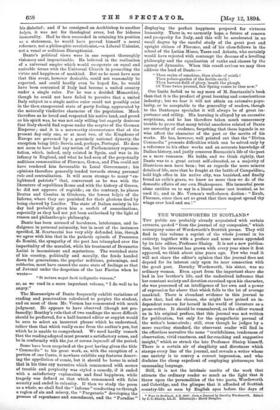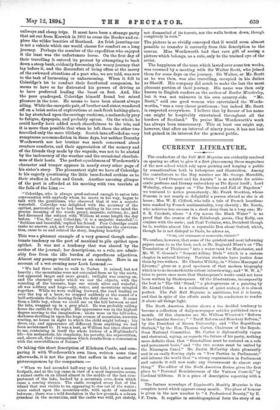THE WORDSWORTHS IN SCOTLAND.*
THE public are probably already acquainted with certain extracts, quoted "from the journal of my companion," which accompany some of Wordsworth's Scottish poems. They will find in this volume a reprint of the whole journal in its entirety, together with a preface and some notes appended by its late editor, Professor Shairp. It is not a new publica- tion, but its interest has grown with every year since it first appeared, we think about nine years ago. Few who read it will not share the editor's opinion that the journal does not depend for its interest only upon its near connection with the great poet. Dorothy Wordsworth, his sister, was no ordinary woman. Even apart from the important share she had in her brother's life, and the undoubted influence that her constant society and devotion exercised upon his character, she was possessed of an intelligence of her own and a power of expression far above that which falls to the lot of average mankind. There is abundant evidence in this journal to show that, had she chosen, she might have gained an in- dependent renown for herself in the world of literature as a prose-writer. It should be remembered, as the editor warned us in his original preface, that this journal was not written for publication, but only for the sympathetic perusal of the writer's home-circle ; still, even though he judges by a more exacting standard, the observant reader will find in the effortless narrative the same "truthfulness, tenderness of observation, vivid exactness, and far-reaching and suggestive insight," which so struck the late Professor Shairp himself. There is a certain air of simplicity and directness which stamps every line of the journal, and reveals a writer whose one anxiety is to convey a correct impression, and who disdains the cheap expedient of employing picturesque but unmeaning language.
Still, it is not the intrinsic merits of the work that attracts the ordinary reader so much as the light that it threw upon the personalities of the two poets, Wordsworth and Coleridge, and the glimpse that it afforded of Scottish country-life as seen by English eyes before the days of • Tour in Scotland, A.D. 1603 front a Journal by Dorothy Wordsworth. Edited by J. 0. Bhairp, LL.D. Edinburgh: David Douglas.
railways and cheap trips. It must have been a strange party that set out from Keswick in 1803 to cross the Border and ex- plore the wilder beauties of Scotland. An Irish jaunting-car is not a vehicle which one would choose for comfort on a long Journey. Perhaps the member of the expedition who enjoyed it the least was the unfortunate horse. On the first day of their travelling it entered its protest by attempting to back down a steep bank, evidently foreseeing the weary journey that lay before it, and the discomfort of being often at the mercy of the awkward attentions of a poet who, we are told, was new to the task of harnessing or unharnessing. When it fell to Coleridge's lot to conduct their fourfooted companion, he seems to have so far distrusted his powers of driving as to have preferred leading the beast on foot. And, like the poor quadruped, Coleridge himself found but mixed pleasure in the tour. He seems to have been almost always ailing. While the energetic pair, of brother and sister, wandered off on a brisk series of explorations at each fresh halting-place, he lay stretched upon the carriage cushions, a melancholy prey to fatigue, dyspepsia, and probably opium. On the whole, he could hardly have added much cheerfulness to the trio, and it is more than possible that when he left them the other two travelled only the more blithely. Scotch inns afforded no very sumptuous accommodation in those days, but neither Dorothy Wordsworth nor her brother was much concerned about creature comforts, and their appreciation of the scenery and of the friends they made by the wayside, was not to be abated by the inclemency of the weather and the occasional churlish- ness of their hosts. The perfect equableness of Wordsworth's character and temper appears in nearly every other page of his sister's story. The pleasantest sight we have of Coleridge is his eagerly questioning the little bare-footed urchins as to their studies in Latin and Greek. Another amusing glimpse -of the poet is afforded at his meeting with two tourists at the falls of the Linn :—
" Coleridge, who is always good-natured enough to enter into conversation with anybody whom he meets in his way, began to talk with the gentleman, who observed that it was a majestic waterfall. Coleridge was delighted with the accuracy of the epithet, particularly as he had been settling in his own mind the precise meaning of the words grand, majestic, sublime, &e., and had discussed the subject with William at some length the day before. Yes, Sir,' says Coleridge, it is a majestic waterfall?— ' Sublime and beautiful,' replied his friend. Poor Coleridge could snake no answer, and, not very desirous to continue the conversa- tion, came to us and related the story, laughing heartily."
This was a pleasant example of a very general though unfor- tunate tendency on the part of mankind to pile epithet upon epithet. It was not a tendency that was shared by the author of the journal; her descriptions, as a rule, are admir- ably free from the idle burden of superfluous adjectives.
Almost any passage would serve as an example. Here is an account of a wet evening near Loch Lomond :— " We had three miles to walk to Tarbet. It rained, but not heavily ; the mountains were not concealed from us by the mists, but appeared larger and more grand ; twilight was coming on, and the obscurity under which we saw the objects, with the sounding of the torrents, kept our minds alive and wakeful; all was solitary and huge—sky, water, and mountains 'mingled together. While we were walking forward, the road leading us over the top of a brow, we stopped suddenly at the sound of a half-articulate Gaelic hooting from the field close to us. It came from a little boy, whom we could see on the hill between us and the lake, wrapped up in a grey plaid. He was probably calling home the cattle for the night. His appearance was in the highest degree moving to the imagination; mists were on the hill-sides, darkness shutting in upon the huge avenue of mountains, torrents roaring, no house in sight to which the child might belong ; his dress, cry, and appearance all different from anything we had been accustomed to. It was a text, as William has since observed to me, containing in itself the whole history of a Highlander's life—his melancholy, his simplicity, his poverty, his superstition, and, above all, that visionariness which results from a communion with the unworldliness of Nature."
Or taking this short description of Kilchurn Castle, and com- paring it with Wordsworth's own lines, written some time afterwards, it is not the prose that suffers in the matter of picturesqueness by the comparison :—
"When we had ascended half-way up the hill, I took a nearer footpath, and at the top came in view of a most impressive scene, a ruined castle on an island almost in the middle of the last com- partment of the lake, backed by a mountain cove, down which came a roaring stream. The castle occupied every foot of the island that was visible to ns, appearing to rise out of the water; mists rested upon the mountain-side, with spots of sunshine between ; there was a wild desolation in the low grounds, a solemn grandeur in the mountains, and the castle was wild, yet stately, not dismantled of its turrets, nor the walls broken down, though completely in ruin."
The picture is so vividly conveyed that it would seem almost possible to transfer it correctly from this description to the canvas. Miss Wordsworth had that rare gift of seeing a picture which belongs, as a rule, only to the trained eye of the artist.
The happiness of the tour, which lasted over some ten weeks, was crowned by a meeting with Sir Walter Scott, who joined them for some days on the journey. Sir Walter, or Mr. Scott as he was then, was also travelling, occupied in his duties as Sheriff. His company did much to make the last the most pleasant portion of their journey. His name was then only known to English readers as the author of Border Minstrelsy, but it was not unknown in his own country-side. "Mr. Scott," said one good woman who entertained the Words- worths, "was a very clever gentleman: but indeed Mr. Scott is respected everywhere. I believe that by favour of his name one might be hospitably entertained throughout all the borders of Scotland." To praise Miss Wordsworth's work has always been unnecessary. This at least one might say, however, that after an interval of ninety years, it has not lost but gained in its interest for the general public.



































 Previous page
Previous page